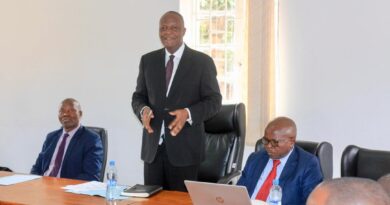Bank of Zambia’s Statutory Reserve Ratio Increase Impacts Local Economy
The Bank of Zambia (BOZ) is set to implement a 3% or 300 basis point increase in the statutory reserve ratio, starting from November 13th.
According to Kelvin Chisanga, an economist, this decision is expected to have far-reaching consequences for Zambia’s domestic economy.
While the primary objective is to stabilize the Kwacha and curb inflation, Chisanga views this increase in the statutory reserve ratio as a necessary monetary policy instrument to address inflation and forex losses.
However, the immediate impact is estimated to withdraw approximately K2.4 billion from the market, effectively acting as an aggressive policy measure to restrict credit expansion.
This, in turn, may lead to tight liquidity conditions and a decrease in economic activity, alongside an increase in non-performing loans.
Mr Chisanga suggests that this policy change will cast a shadow on the local economy by reducing deposit volumes in commercial banks. This is expected to significantly affect loanable funds available for businesses, especially for those seeking overdrafts, advances, and guarantees.
In addition to these monetary measures, the economy is also grappling with the influence of political turbulence and the rising costs of essential commodities.
Mr Chisanga emphasizes the growing need to boost agriculture and ensure timely delivery of farming inputs as a way to mitigate these challenges.
While increasing the statutory reserve ratio is aimed at taming inflation, it comes with some offsetting effects. Mr Chisanga anticipates a dampening effect on local economic growth, affecting market demands and conditions for credit expansion.
The local markets for agriculture and mining products may also feel the impact, leading to an increase in the government’s cost of borrowing. This policy intervention is expected to have a direct impact on stocks and bond maturities, potentially reducing returns on investment.
However, Mr Chisanga notes that some elements, such as debt restructuring, have been missed in the policy measures.
Critics argue that these central bank strategies may not be the most effective tools to combat inflation and that a more comprehensive assessment of industry performance is needed.
Some fear that the increase in the statutory reserve ratio could result in a drop in production and an increase in demand, potentially exacerbating inflation.
In the short to medium term, commercial banks may resort to raising interest rates on new loans to recover the K2.4 billion in lost interest income. This could make access to credit more challenging and expensive.
However, MR Chisanga points out that the broader impact on the local market may be limited, as many Zambians do not have access to credit lines. The increase in the cost of capital is expected to have a muting effect on Zambia’s economic conditions and activity, according to Kelvin Chisanga, the economist.



